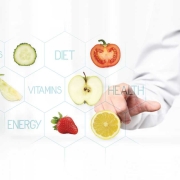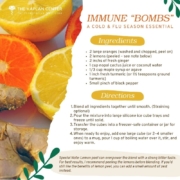5 Healthy Foods That Are Even More Nutritious When Paired Together
To maintain optimal health, our bodies need vitamins, minerals, and phytonutrients. Whole foods, like fruits, vegetables, whole grains, legumes, and nuts, are packed with these important compounds. They naturally help us boost our immune system, fight inflammation, and ward off chronic illness.
But as a physician and founder of the Kaplan Center for Integrative Medicine, I also explain to my patients that optimal nutrition can go one step further. Have you heard of food synergy? It’s an idea that has gained popularity in recent years and it maintains that certain components of different foods can work synergistically to bring greater nutritional benefit to our bodies.
For example, turmeric combined with black pepper (or more specifically piperine, a compound found in black pepper) increases the absorption of turmeric’s active ingredient, curcumin. Curcumin has powerful antioxidant and anti-inflammatory properties that help prevent free radical damage and calm the inflammatory process at the root of many chronic diseases. This is a great illustration of food synergy at work — in which the right combination of substances work together to increase nutritional value and bring greater benefits to your body.
Interested in adding this idea to your diet? You might not realize it, but many common snacks and meals you already eat put the concept of food synergy into practice. Here are a few key examples of these pairings, and why they work.
1. Bananas & Greek yogurt
Bananas contain inulin, a plant-based carbohydrate. Research shows that inulin, when added to yogurt, can increase the growth of yogurt’s healthy bacteria, thereby helping to regulate digestion even further and boost immunity.
If you already enjoy yogurt as part of your breakfast or as a snack, make sure to choose an unsweetened Greek variety, which contains more protein, and then add your own fresh bananas.
2. Spinach with garbanzo beans & red bell peppers
While heme iron (iron from meat, fish, and poultry) is well-absorbed, non-heme iron (found in grains, legumes, certain vegetables, and nuts) is less well-absorbed. Fortunately, research shows that vitamin C (ascorbic acid) assists in the absorption of non-heme iron — important for those who follow a plant-based diet.
A spinach and garbanzo bean salad (rich in non-heme iron) combined with fresh red bell peppers, a good source of ascorbic acid, makes a delicious and healthful meal, particularly for those who may be at a higher risk of iron deficiency.
Questions? Give Us a Call!
3. Vegetables & olive oil
Research suggests that vegetables, particularly colorful ones such as tomatoes, peppers, spinach, broccoli, and kale, should be eaten with healthy monounsaturated oils — such as olive oil — to increase your body’s absorption of carotenoids, a type of phytonutrient that has powerful antioxidant and anti-inflammatory properties.
Adding whole eggs or avocados, which contain healthy monounsaturated fats, to a salad will also help to boost the absorption of carotenoids.
4. Green tea & lemon
A 2007 study from Purdue University found that adding either citrus juices or vitamin C to green tea will boost the absorption of catechins, a powerful naturally occurring antioxidant found in the tea.
Why is this important? Studies have shown that catechins have cancer-preventing effects and that they can also positively affect cardiovascular health because of their antioxidative, anti-hypertensive, and anti-inflammatory effects.
5. Dark chocolate & apples
This combination isn’t just delicious — it can also help improve cardiovascular health. Dark chocolate (70 percent cacao or more is best) is rich in catechins, and apples are a rich source of the flavonoid quercetin. When eaten together, research suggests that the catechins and quercetin work synergistically to inhibit platelet adhesion to collagen.
The Bottom Line:
Some foods were just meant to be eaten together! While these are great examples to keep in mind, the simplest way to put the concept of “food synergy” into practice is to eat a wide variety of whole foods. Doing so ensures that you receive the key nutrients your body needs to thrive.
We are here for you, and we want to help.
Our goal is to return you to optimal health as soon as possible. To schedule an appointment please call: 703-532-4892 x2
Do you…
- feel tired most of the time or have an energy crash midday?
- struggle with gas, bloating, abdominal pain, reflux, constipation, or diarrhea?
- worry about your weight?
- have trouble concentrating or brain fog?
- suspect you have food intolerances or sensitivities?
- feel lost about what’s “healthy” to eat or if you should take supplements?
Or, if you’ve been diagnosed with or suspect you have a more serious nutritional problem like IBS, Crohn’s, Colitis, SIBO, or GERD, the Kaplan Center can help you.
When nutrition plays a role in a your medical problems – and this is often true – our goal is to investigate the root cause of your discomfort and not just treat the symptoms. We use an Integrative & Functional Nutrition (IFN) approach to to identify underlying imbalances or deficiencies that may be impacting your health.
If you’re ready to make a change and need help, please give us a call today.











Leave a Reply
Want to join the discussion?Feel free to contribute!